
Library Science is a challenging and rewarding field with a variety of career possibilities. A love of reading and passion for helping others are among the characteristics that define librarians. Most professional positions require a master's degree. Graduates qualify for jobs at elementary, middle, and high schools as well as at universities. Sometimes graduates even move on to have employment opportunities at corporations, consulting companies, and non-profit organizations. School librarians help students improve their reading skills and assist faculty in conducting research. Jobs in public, corporate, law, medical, and other special libraries involve research, cataloging, evaluating, organizing, and preserving written documents and databases. Librarians often are called upon to create programs for students, teachers, employers, or the public.
Recently posted openings for library science master's degree holders have been for data scientists, software engineers, network administrators, research directors, information architect, library administrator, information broker, media specialist, and project manager. The median salary for such positions in 2017 was $58,520, according to the U.S. Bureau of Labor Statistics. The agency predicts that between 2016 and 2016, the number of jobs in the field will increase 9 percent — a faster growth rate than the average occupation. That means the demand for librarians is likely to remain strong for the foreseeable future. One of the reasons for the employment expansion is the ongoing shift to digital librarianship, which requires expertise in the latest technological advancements and programs.
Most master's programs offer a variety of specializations to help students craft their studies according to individual interests and career goals. Among the choices are information systems, data science, database administration, digital librarianship, archives and preservation, data curation, child and youth services, school library media, and law librarianship. Some programs are exclusively on campus or online, while others allow students to combine the options. After satisfying the coursework requirements, which generally takes one to three years for a full-time student, the final step is often an internship at a library or other information organization. Typical entrance requirements for graduate programs are school transcripts, a bachelor's degree with a minimum grade-point average, an acceptable score on the Graduate Records Examination (GRE), letters of recommendation, a resume, and a personal statement of purpose. Applicants for master's classes sometimes have to prove their proficiency in certain technological programs or take additional courses.
Ranking Methodology: "It's science!"
The researchers and writers at Best Master's Degrees don't make recommendations based upon preference– we back our rankings with science. Here's a quick breakdown of how we organize ranking data:
- Finances (40%)
- Academic Rigor (35%)
- Student Gratification (25%)
Nearly half of the data used to score each ranking involves finances and are acquired from sources such as the National Center for Education Statistics, the U.S. Department of Labor, U.S. Department of Education, Glassdoor, and PayScale. Financial data encompasses the cost of tuition, fees, and class supplied; the average price of living; access to financial aid and social services; and lastly, the projected annual salary acquired from degree outcomes and income for loan repayment. The second largest category of information involves the quality of education, how competitive degree applicants should be for consideration, and how exclusive a degree program is overall. The final 25 percent of collected data is dependent on student and alumni reviews from sources such as PayScale, Rate My Professor, and Students Review.
Want to Learn More?
The amount of information available for specific degrees is plentiful, and Best Master's Degrees aims to provide as many resources as we can. Check out our Methodology page for more information and resource links.
#30 – University of Kentucky
Master's of Science in Library Science
Lexington, Kentucky
Website

Lexington, known as the Horse Capital of the World, is home to more than 120 locally owned restaurants and the "Brewgrass Trail" of craft beer breweries.
A public university with roots going back more than 150 years, The University of Kentucky comes in at No. 147 on U.S. News & World Report's list of the nation's top post-secondary institutions. About 30,000 students are enrolled in 16 colleges and schools that offer more than 120 master's degrees. The master's in library science involves a 36 credit hour curriculum that full-time students can finish in less than two years. The program, designed for those already working in libraries or related occupations, is also available online. The core classes are Information in Society; Information Seeking, Retrieval, and Services; Information Representation and Access; and Management in Library Information Services. Students may take General Studies to satisfy the remaining coursework requirements, or pursue a concentration in one of six areas of interest: Academic Libraries, Health Information, Information Technology and Systems, Public Libraries, School Libraries, or Youth Services and Literature. In addition, students must complete a practicum that provides practical experience.
Graduate Tuition/Fees: $11,363 / $28,861
#29 – Kutztown University of Pennsylvania
Master of Library Science
Kutztown, Pennsylvania

KU, which is not nearly as large as most of the schools on this list, is in the eastern Pennsylvania community of Kutztown (population 5,000).
Founded in 1866 as a teaching college this public institution enrolls about 8,500 students in four degree-granting schools. Despite the relatively small enrollment the student body represents 40 countries. The student-to-faculty ratio is 18:1. KU's beautiful campus has won the GreenStar award for its landscaping and architecture. There is a planetarium, observatory, arboretum, and campus radio station. About 80 percent of alumni are either employed or pursuing more education soon after receiving their graduate degrees. The Master's in Library Science is a 36 credit-hour program designed for professional information specialists working in public and private libraries. The curriculum is also available online to provide flexibility. Core courses are Foundations of Information Science; Information Resources and Services; Resources For Children and Young Adults; Technologies for the Century Educator; Makerspaces and Technology Enhanced Programming; Management of Information and Technology Centers; Collecting and Curating Print and Digital Resources; Organization of Information, Metadata and Library Technologies; Educational Program of the School Library; Media Center Methods of Research; and Digital Portfolios.
Graduate Tuition/Fees: $9,000 / $13,500
#28 – Valdosta State University
Master of Library and Information Science
Valdosta, Georgia
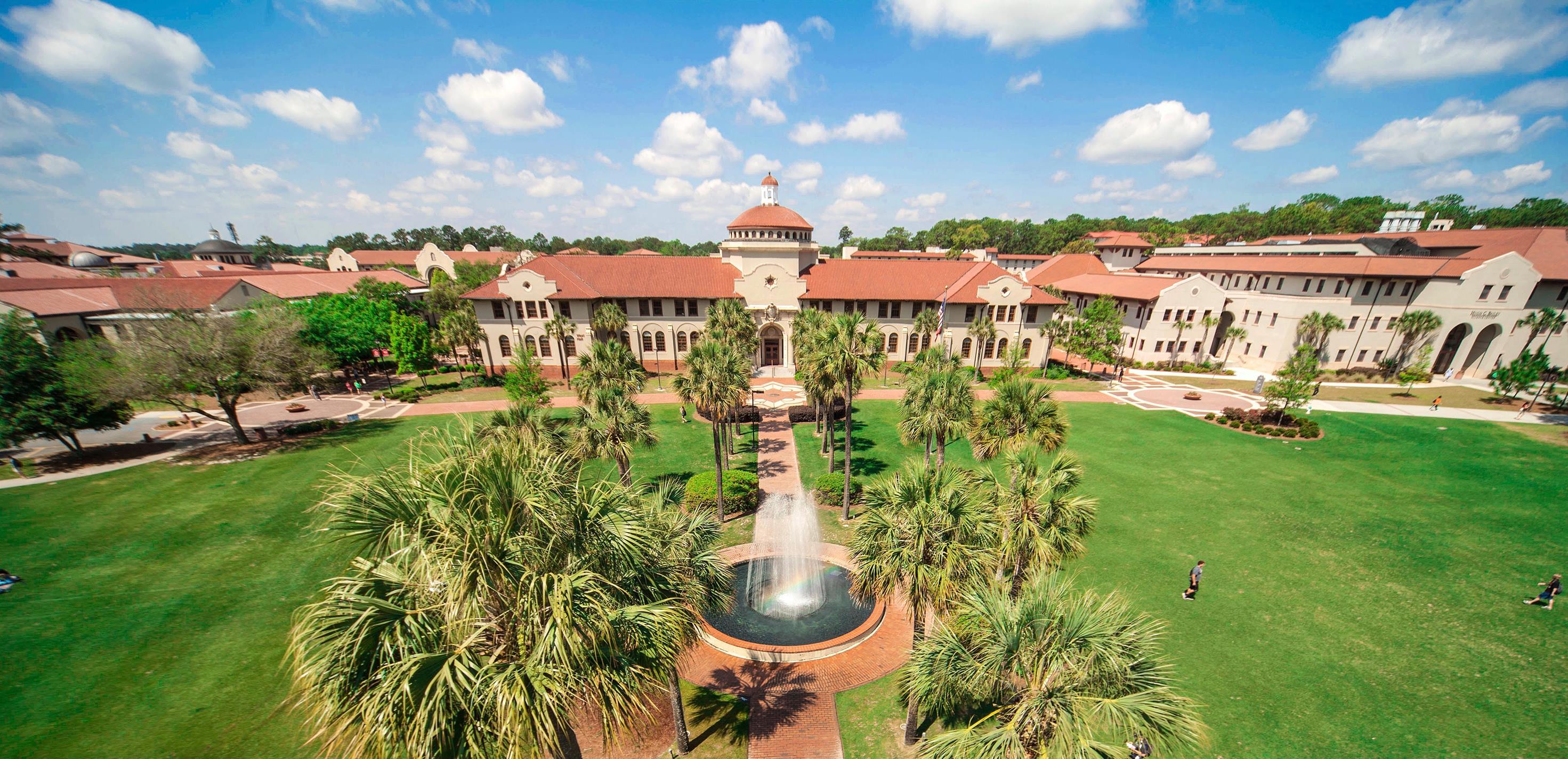
VSU has been awarding degrees since 1906 when it was a teachers college that charged $10 for annual tuition and $12 per month for room and board.
More than 11,000 students from 76 countries are enrolled at this public university. The campus is in a city of 120,000 residents about 20 miles north of Florida. VSU offers a warm climate as well as a gorgeous campus with palm trees, live oaks, and fountains. The university has study-abroad relationships in more than 100 foreign locations. The Master's in Library and Information Science is a 39 credit hour, non-thesis program that is primarily completed online. It is crafted to allow professional students to continue working while taking classes. The curriculum focuses on educating librarians for academic, public, and special libraries. In 2017-18 the enrollment was 135 – about half of the number of students who applied. Classes cover subjects such as administration, resources for clients, services in the knowledge society, and technical knowledge. Students learn about organizing and retrieving information, information services, information resources, and information systems. The university offers four optional tracks: library management, cataloging and classification, technology, and reference sources and services.
Graduate Tuition/Fees: $4,482 / $16,146
#27 – Emporia State University
Master of Library Science
Emporia, Kansas
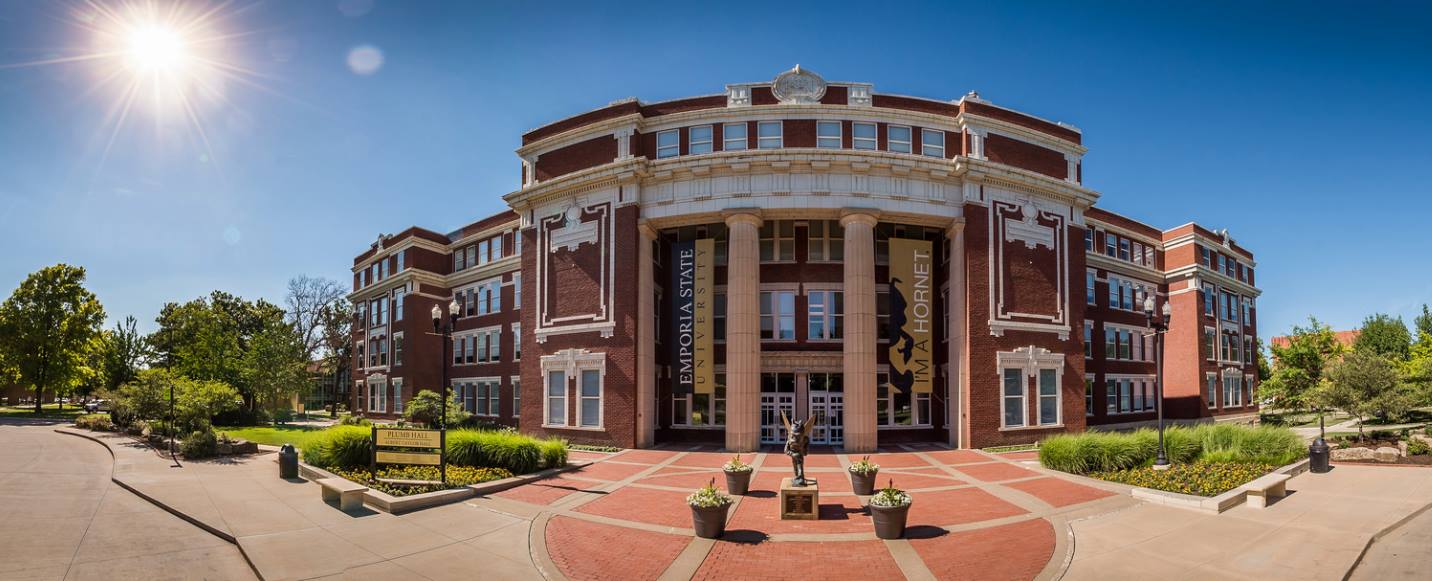
In 1906, this university's School of Library and Information Management became the first college of its kind in the western half of the United States.
ESU is a public institution that enrolls about 5,800 students in four schools. It was founded in 1863 to educate teachers and continues to do so. The student-to-faculty ratio is 18:1. The master's in library science is a 36-credit-hour program that takes as little as 16 months to complete. Some courses are entirely online, while others require two or more face-to-face weekend intensive sessions at one of the campuses in Emporia and Overland Park, Kansas; Denver, Colorado; and Salt Lake City and Orem, Utah. The core classes consist of Foundations of Library and Information Science, Information-Seeking Behavior and Reference Services, Organization of Information, Management in Information Organizations, Research in Library and Information Science, Collection Development, and finishing off with a capstone course assessing the program. Students also must take a technology class in Information, Web Design and Development, Database Design, or another approved subject. An additional 14 elective credit hours – which can include a nine-hour concentration – are required as well.
Graduate Tuition/Fees: $6,084 / $18,924
#26 – Wayne State University
Master of Library and Information Science
Detroit, Michigan

This school's campus is in Midtown Detroit's Cultural Centre Historic District, home to museums, galleries, and theaters.
WSU, established in 1868, is one of the 50 largest public postsecondary institutions in the country having more than 27,000 students enrolled. Forty percent of the student body are racial minorities and 56 percent are women. Thirteen colleges and schools offer more than 350 academic programs, with a student-to-faculty ratio of 14:1. All students have the opportunity to take part in research projects. Detroit is a large, diverse city known for its music, art scene, and relatively low cost of living. The Master's of Library and Information Science program involves 36 credit hours, half of which are the following core courses: Introduction to the Information Profession, Information Technology, Access to Information, Organization of Knowledge, Library Administration and Management, and School Library Media Programs. Students take elective classes in one of three pillar specializations including Library Services, Information Management, or Archives and Digital Content Management. A valid teaching certificate is a prerequisite for admission to the program.
Graduate Tuition/Fees: $15,336 / $33,217
#25 – University of North Carolina Greensboro
Master of Library and Information Studies
Greensboro, North Carolina

This school has won acclaim for its small classes and for assisting low-income and minority students.
UNC Greensboro, which began in 1891 as a women's college, still has an enrollment that is two-thirds female. U.S. News & World Report ranks the university No. 109 among the nation's public universities and the Princeton Review has called it the No. 2 best value school. More than 20,000 students representing 90 countries attend classes on an urban campus mid-way between Washington D.C., and Atlanta. The Master's in Library and Information Studies entails 36 credit hours of coursework that takes most students three years to complete. The core courses are Foundations of Library and Information Studies, Information Sources and Services, Information Organization and Access, Library Administration and Management, and Computer-Related Technologies for Information Management. In addition, 19 credit hours of elective classes and the completion of a capstone project are required. A professional practicum at an information organization is strongly recommended. Students may customize their degrees by specializing in Archives and Special Collections, Cataloging, Children and Youth, Digital Collections, Instruction Librarianship, or Public Librarianship.
Graduate Tuition/Fees: $5,219 / $18,937
#24 – University of Wisconsin Milwaukee
Master of Library & Information Science
Milwaukee, Wisconsin

This urban campus, just a few blocks from Lake Michigan, gives students access to outdoor recreational opportunities as well as Milwaukee's historical and cultural attractions.
More than 27,000 students attend classes in 13 colleges and schools at UWM, a leading public research institution. The enrollment represents 92 countries. There are 64 master's programs from which to choose. The Master's in Library and Information Science is a 36 credit hour curriculum or 30 hours for those who already hold a master's or doctorate degree in another field as the school requires two classes outside the degree subject. Core courses consist of Foundations of Library and Information Science, Organization of Information, Information Access and Retrieval, and Research Methods in Information Studies. Students work with faculty advisers to select elective classes that pertain to their specific interests and career goals. Maintaining a B average in all the courses is one of the requirements for earning the degree. There is also a thesis option available for consideration. When all coursework is completed, the next step is to take part in fieldwork to gain practical experience. Students who have already been employed in libraries may earn exemptions from this mandate.
Graduate Tuition/Fees: $10,387 / $23,424
#23 – University of Oklahoma
Master of Library and Information Studies
Norman, Oklahoma

OU reportedly has the No. 1 research campus in the United States, and tops a list of the happiest students.
The Norman campus of this public research university is a 20-minute drive from Oklahoma City. The institution, which traces its history to 1890, placed 58th in U.S. News & World Report's latest ranking of the country's best public universities. No school boasts more National Merit Scholars than the University of Oklahoma. The overall enrollment totals about 31,700. The Master's in Library and Information Studies is a 36 credit hour program which most students complete within two or three years. In addition to the coursework and practical experience in real-world libraries, students must pass a comprehensive exam, write a thesis, or create a portfolio. The required classes are Information and Knowledge Society, Management of Information and Knowledge Organizations, Organization of Information and Knowledge Resources, Information Users in the Knowledge Society, Information and Communication Technology, and Research Methods and Evaluation Methods. In addition, students take six elective courses in specializations relating to Academic Librarianship, Archives, Children and Young Adult Services, Information Organization, Information Technology, Public Librarianship, Reference Services, School Library Media, or Special Librarianship.
Graduate Tuition/Fees: $5,119 / $19,778
#22 – University of Iowa
Master of Arts in Library and Information Science
Iowa City, Iowa
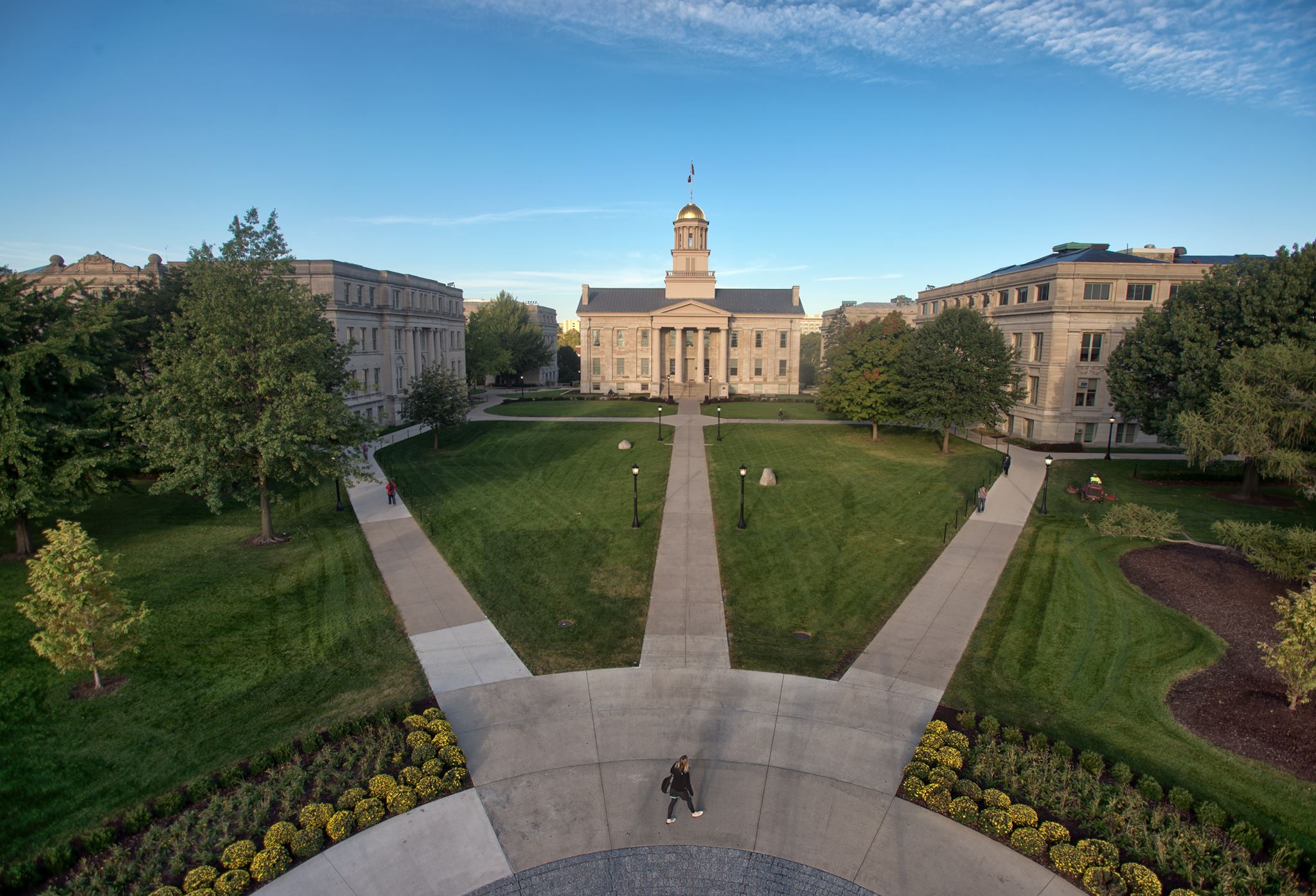
The University of Iowa ranks as the No. 38 best public university in the country, according to U.S. News & World Report, with 13 graduate programs ranking in the newspaper's top 10.
Founded in 1847, the University of Iowa has grown into a large institution with 11 colleges and schools. The enrollment of about 33,000 students represent all 50 states and an additional 115 countries. Faculty and alumni have won more than 40 Pulitzer Prizes, and the Fiske Guide to Colleges consistently includes the university on its list of best value postsecondary schools. The Master's Degree in Library and Information Science is a 36 semester-hour program that takes full-time students two years to complete. The initial requirements are attending a proseminar and taking classes in cultural, computing, conceptual, and contextual foundations. Students must select a contextual specialization course in College and University Libraries, Public Libraries, Special Libraries, or School Library Media Administration. There are multiple options for the eight mandated elective classes. Certificates are available in Informatics, and Book Studies/Book Arts and Technologies. Informatics subprograms include Bioinformatics, Computational Biology, Geoinformatics, Health Informatics, and Information Science.
Graduate Tuition/Fees: $9,427 / $28,163
#21 – University of South Carolina
Master of Library and Information Science
Columbia, South Carolina

USC has earned high rankings for best value, advanced degree programs, and delivering world-ready graduates.
This public university's long history began in 1801, with an enrollment of only nine students. Today more than 35,000 students attend 13 colleges and schools. About 6,500 graduate students are pursuing 250 kinds of advanced degrees. The university placed No. 109 on U.S. News & World Report's list of the best post-secondary institutions in the country. Fifty-four percent of students receive financial aid, and the student-to-faculty ratio is 17:1. The Master's in Library and Information Science features a 36 credit hour curriculum that includes three required courses which cover basic principles and fulfill a technology competency requirement. Elective classes are based on a student's career interests. Among the choices are Storytelling, Children's Literature, Music Libraries, Digital Archives, Government Documents, and Planning Library Facilities. About 140 students enroll in the program and 135 of them receive degrees every year on average. They have an average GPA of 3.37 and a median GRE score of 308. Two-thirds of the class of 2018 received either a promotion or a salary increase after graduating.
Graduate Tuition/Fees: $12,854 / $27,968
#20 – Drexel University
Master of Science in Library & Information Science
Philadelphia, Pennsylvania

Drexel was the first university in the country to require all students to have microcomputers in 1983 and the first to create an entirely wireless campus in 2000.
This university, founded in 1891, ranks No. 102 on the U.S. News & World Report list of the Nation's Best Postsecondary Institutions. It is also one of the 15 largest private universities in the country. More than 27,000 students, 8,700 of which are in graduate and professional studies, are enrolled at 13 colleges and schools. The student-to-faculty ratio is an outstanding 11:1. Ninety-six percent of graduates either secure employment or continue their education. In 2018 U.S. News rated the university's graduate school No. 11 nationally. The Master's in Library and Information Science, which was one of the first of its kind, involves 45 credit hours in the classroom. Students also gain practical experience in a variety of settings. The core courses consist of classes such as Information Professions and Professionals; Users, Services, and Resources; Leading and Managing Information Organizations; Organization of Data and Information; and Data and Digital Stewardship. Students may complete the program on campus or online in either full-time or part-time schedules.
Graduate Tuition/Fees: $33,156
#19 – Simmons University
Master of Library and Information Science
Boston, Massachusetts

Simmons is within walking distance of 15 other universities and colleges in Boston which has been called the best college town in the country.
This is a small school in a big city. About 1,700 undergraduates and 4,000 graduate students enjoy an excellent student-to-faculty ratio of 12:1 with the average class size being around 14. Simmons is quite selective, accepting only 61 percent of the freshman applications it receives. The university places 11th among postsecondary institutions in the northern half of the country in the U.S. News & World Report's ranking, and Kiplinger's Personal Finance includes Simmons on its list of best value schools. The university started in 1899 as a women's college. Today, it is coeducational but two-thirds of the faculty members are women. The Master's in Library and Information Science is a 36 credit hour program available both online and on campus. Core courses include Information Organization, Reference and Information Services, and Technology for Information Professionals. Students may choose a concentration in Archives Management, Cultural Heritage, or School Library Teaching. Career tracks include Information Organization, Management and Leadership, Preservation Management, Reference and Information Services, and Youth Services.
Graduate Tuition/Fees: $20,988
#18 – Kent State University
Master of Library and Information Science
Kent, Ohio

This university won the Active Minds organization's Healthy Campus award in 2018 for its "strategic focus on the health and well-being of students," and reportedly has one of the nation's 25 safest campuses.
Kent State ranks at No. 104 among the nation's universities on the U.S. News & World Report list. The main campus in Kent, one of the institution's 11 sites, is just 40 miles south of Cleveland. More than 38,000 students, 61 percent of whom are women, attend classes in ten colleges. The student body represents 140 countries. Kent State offers more than 300 academic programs and 200 education-abroad opportunities in 60 countries. The Master's in Library and Information Science at the School of Instruction is a 36 credit hour program. The important core courses are Information Landscape; either Information Organization or Cataloging for School Libraries; and either Information Institutions and Professions or Research and Assessment. Students create individual career paths by choosing seven classes in one of 14 specializations. They may satisfy some of the electives requirements by taking courses in other master's programs covering Health Informatics, Knowledge Management, or User Experience Design. A thesis option is available as a substitute for two classes.
Graduate Tuition/Fees: $11,310 / $20,396
#17 – University of Pittsburgh
Master of Library and Information Science
Pittsburgh, Pennsylvania
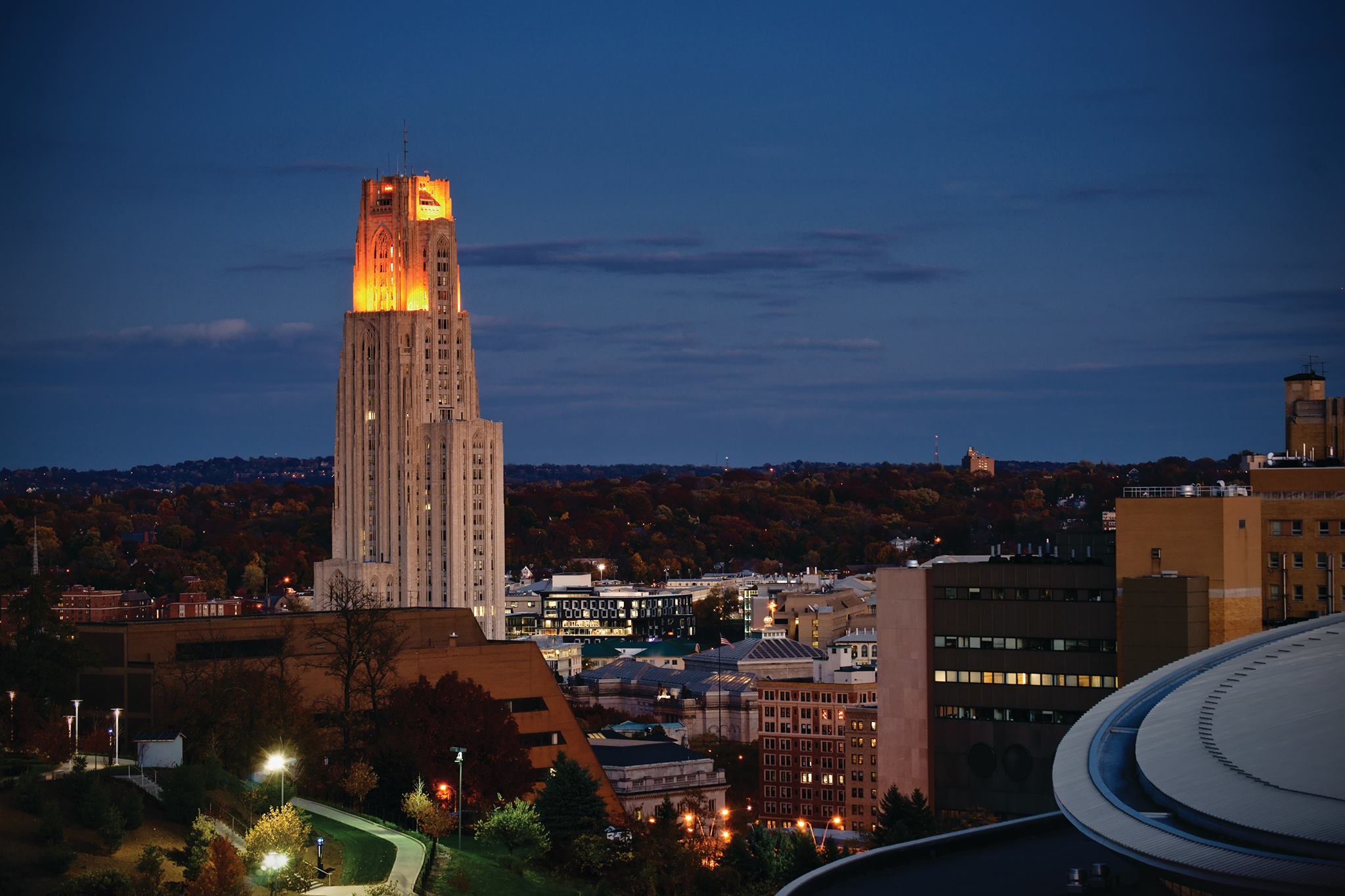
Pitt has a reputation for affordability, having placed high on the Princeton Review's list of Colleges That Pay You Back and in a survey of best value colleges by Kiplinger's Personal Finance.
This public university is one of the nation's oldest institutions of higher learning, having opened its doors in 1787. It ranks as the No. 70 postsecondary school in the country, according to U.S. News & World Report. Pitt is proud of its research and innovation, pointing out that those associated with the school have "defeated polio, unlocked the secrets of DNA, and pioneered TV." More than 36,000 students, including 9,500 in graduate studies, are currently enrolled. The student-to-faculty ratio is 14:1. The 36 credit hour Master's in Library and Information Science can be completed in one year if done on a full-time schedule. The core courses are Life Cycles of Data and Information; Data and Information Systems; The Information Professional in the Community; and Design Methods. Students may specialize in Health Resources and Services; Archives, Preservation, and Records Management; School Library Certification Program; Information Technology; Digital Libraries; Child and Youth Services; or Public Library Services.
Graduate Tuition/Fees: $22,290 / $36,980
#16 – University of Arizona
Master of Arts in Library and Information Science
Tucson, Arizona

In 2018, this large university placed at No. 161 worldwide in the Wall Street Journal and Times Higher Education rankings and No. 77 nationally in the U.S. News & World Report survey.
One of the first postsecondary schools in the western United States, UA dates to 1895 – before Arizona became a state. "Old Main," a magnificent 19th-century structure that houses the university's College of Agriculture, is in the National Registry of Historic Places. Enrollment in all of the University of Arizona's 19 colleges and schools totals about 45,000 including 8,100 graduate students. Only three U.S. universities receive more funding for research activities. Among the 143 master's degrees is the program in Library and Information Science, with a 36 credit hour curriculum that is available either on campus or online. The core courses are made up of Foundations of Library and Information Services, Research Methods for Library and Information Professionals, Organization of Information, and Ethics. Students may specialize in Academic Librarianship, Archival Studies, Digital Information Management, Law Librarianship, Legal Information and Scholarly Communication, Medical and Community Health Information, Public Librarianship, or Special Librarianship. The final requirements are a capstone internship and an electronic portfolio.
Graduate Tuition/Fees: $11,486 / $31,463
#15 – Catholic University of America
Master of Science in Library and Information Science and Religious Studies
Washington, D.C.

This private, nonprofit university is "dedicated to advancing the dialogue between faith and reason" by being "faithful to the teachings of Jesus Christ as handed down by the church."
The nation's only institution of higher learning founded by bishops with a charter from the pope, the Catholic University of America began as a graduate school in 1887. It is ranked as the No. 129 Best University in the Country, according to U.S. News & World Report. Kiplinger's Personal Finance has praised CUA as a best value college. About half of the 6,500 students are pursuing advanced degrees in 12 schools that offer 130 graduate programs. The beautiful campus, in the northeastern part of the city, features large trees, Romanesque architecture, and 29 research centers. Students benefit from taking classes in the nation's capital, home to government agencies, corporate headquarters, foundations, research institutions, and science and technology centers. The Master's in Library and Information Science and Religious Studies is a dual-degree program consisting of 51 semester hour in the university's School of Theology and Religious Studies. Students specialize in either Religious Studies and Archival Management, or General Librarianship and Religious Studies.
Graduate Tuition/Fees: $44,400
#14 – Syracuse University
Master of Science in Library and Information Science
Syracuse, New York

This is the No. 53 university in the country placing No. 11 on the Best Online Graduate Programs by U.S. News & World Report.
A private research institution, Syracuse was founded in 1870 by the Methodist Church in the city of the same name in central New York state. It has consisted of 13 colleges and schools since 1934. The 22,500 member student body, which includes more than 6,600 in graduate studies, represents all 50 states and over 126 countries. The ratio of student-to-faculty is 15:1 and the university has study-abroad relationships in 60 nations. There are more than 200 advanced degrees. The Master's in Library and Information Science, which Syracuse has offered for more than 90 years, features a 36 credit hour curriculum that is available on campus or online in both full-time or part-time formats. The core courses consist of Introduction to the Library and Information Profession; Reference and Information Literacy Services; Library Planning, Marketing, and Assessment; Information Resources: Organization and Access; Management Principles for Information Professionals; and Information Policy. Elective classes cover subjects in 11 main focus areas. Additional requirements are a residence workshop and an internship.
Graduate Tuition/Fees: $36,000
#13 – University of Alabama
Master of Library and Information Studies
Tuscaloosa, Alabama
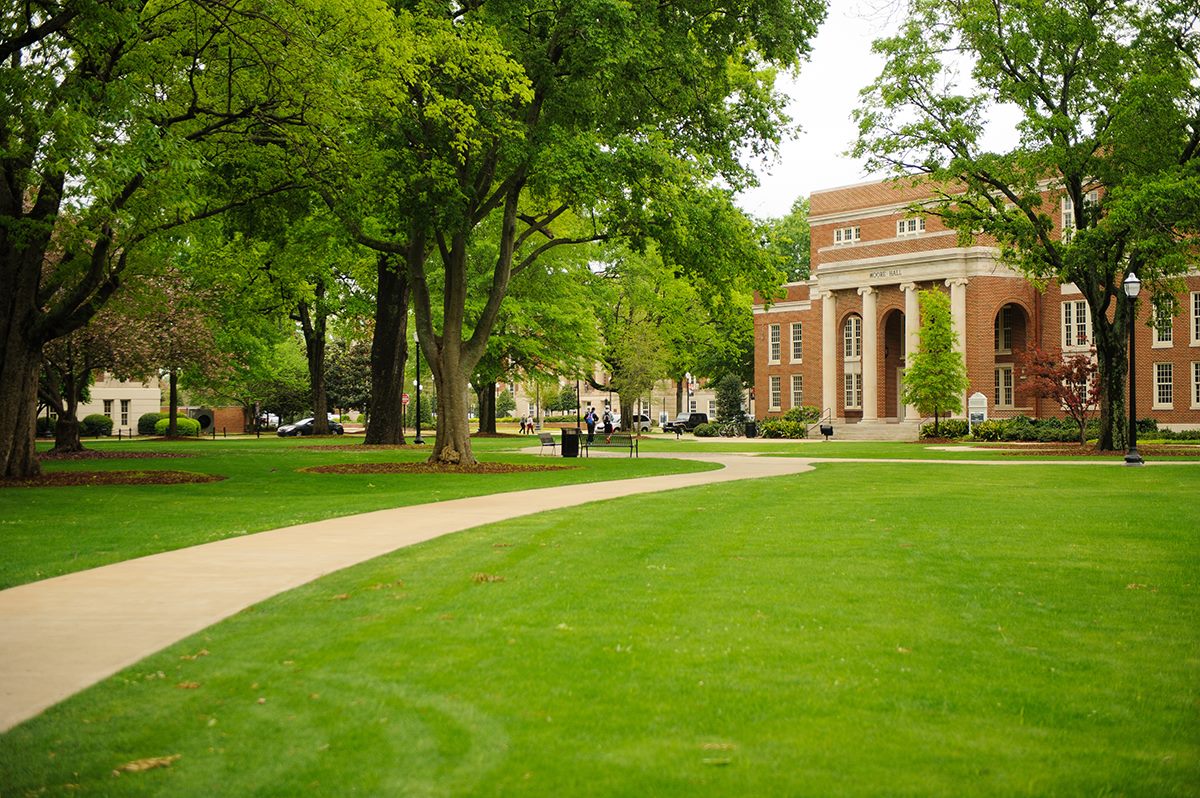
Since this school became Alabama's first public college in 1831, it has survived an attack by Union troops in the Civil War, protests during the Civil Rights movement of the 1960's, and a destructive tornado in 2011.
UA is a big university on a huge 1,200-acre campus. U.S. News & World Report ranks it as the nation's 129th-best postsecondary institution. More than 38,000 students – 56.5 percent of them women – are enrolled in 13 colleges and schools. This is a selective university, admitting only about 56 of those who apply. There are more than 600 National Merit Scholars in the student body, one of the highest percentages in the country. The Master's in Library and Information Studies is primarily online with a few weekend classes at the UA Gadsden Center. Students must have five years of work experience in the field, attend an orientation session, and sign up for 36 credit hours of classes. The core courses are Organization of Information, Introduction to Library and Information Studies, Research Methods, Information Sources and Services, Information Technologies, and one of the following: Administration and Management, Public Libraries, Academic Libraries, School Media Centers, or Special Libraries and Information Centers.
Graduate Tuition/Fees: $10,780 / $28,100
#12 – SUNY at Albany
English Master of Arts / Information Science Master of Science
Albany, New York

This is the 95th-best public college in the country, according to Forbes; and it ranks 82nd on U.S. News & World Report's list of Best Value Postsecondary Schools.
Since its humble beginning in 1844 as a teachers college with nine students in an abandoned railroad depot, UAlbany has grown into a public research university with an enrollment of more than 17,000 including nearly 5,000 in graduate studies. Nine colleges and schools have an average student-to-faculty ratio of 18:1. There are more than 125 graduate programs, a selection which U.S. News consistently ranks in the top 50 nationally. The university's campuses in the state capital give students access to internships and jobs with government agencies and Fortune 500 companies. Thrillist included UAlbany on its list of the 10 Most Beautiful Public Colleges in the United States. The Master's in Information Science is a 59 to 61 credit hour dual-degree program with an MA in either English or history. Career track options include Archives, Records Administration, Library and Information Services, Information Management and Technology, Intelligence Analysis, and Data Analysis. Each student must have field experience, perform an internship, or study abroad.
Graduate Tuition/Fees: $10,870 / $22,210
#11 – University of Southern California
Master of Management in Library and Information Science
Los Angeles, California
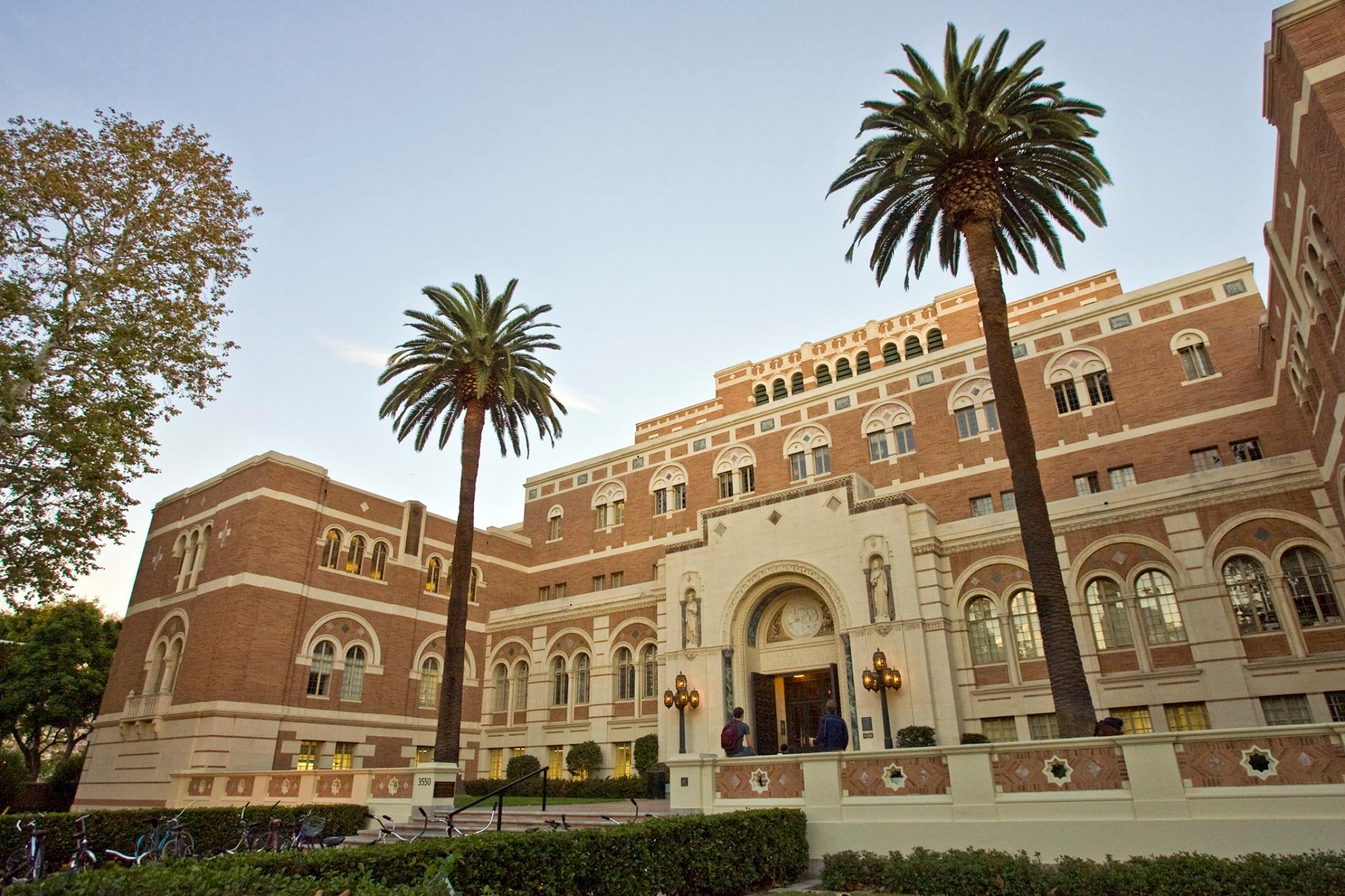
USC, with campuses in the heart of one of the world's most exciting and diverse cities, enrolls more international students than any other university.
A private institution established 140 years ago, USC is ranked No. 22 in the Nation's Best College and No. 5 Postsecondary School for Military Veterans, according to U.S. News & World Report. Nine current faculty members are Nobel laureates. The university has produced 22 billionaires, 288 Olympic Games medalists, and the most Academy Award winners of all postsecondary institutions. Twenty-two graduate and professional schools feature 27,500 students, more than half of USC's total enrollment. The Marshall School of Business, founded in 1920, educates more than 1,700 graduate students annually. Three ratings organizations have placed the school in the top 30 worldwide. The Master's of Management in Library and Information Science at Marshall is a 40 credit hour online program that takes as little as 20 months to complete. The core courses are Fundamentals of Library and Information Science; Fundamentals for Non-business Professionals; Information Description, Organization, and Retrieval; Research Methods; Collection Development and Management; Management Communication for Leaders; Research and Professional Application; and is finished off with a capstone project.
Graduate Tuition/Fees: $43,200
#10 – Indiana University-Bloomington
Master of Library Science
Bloomington, Indiana
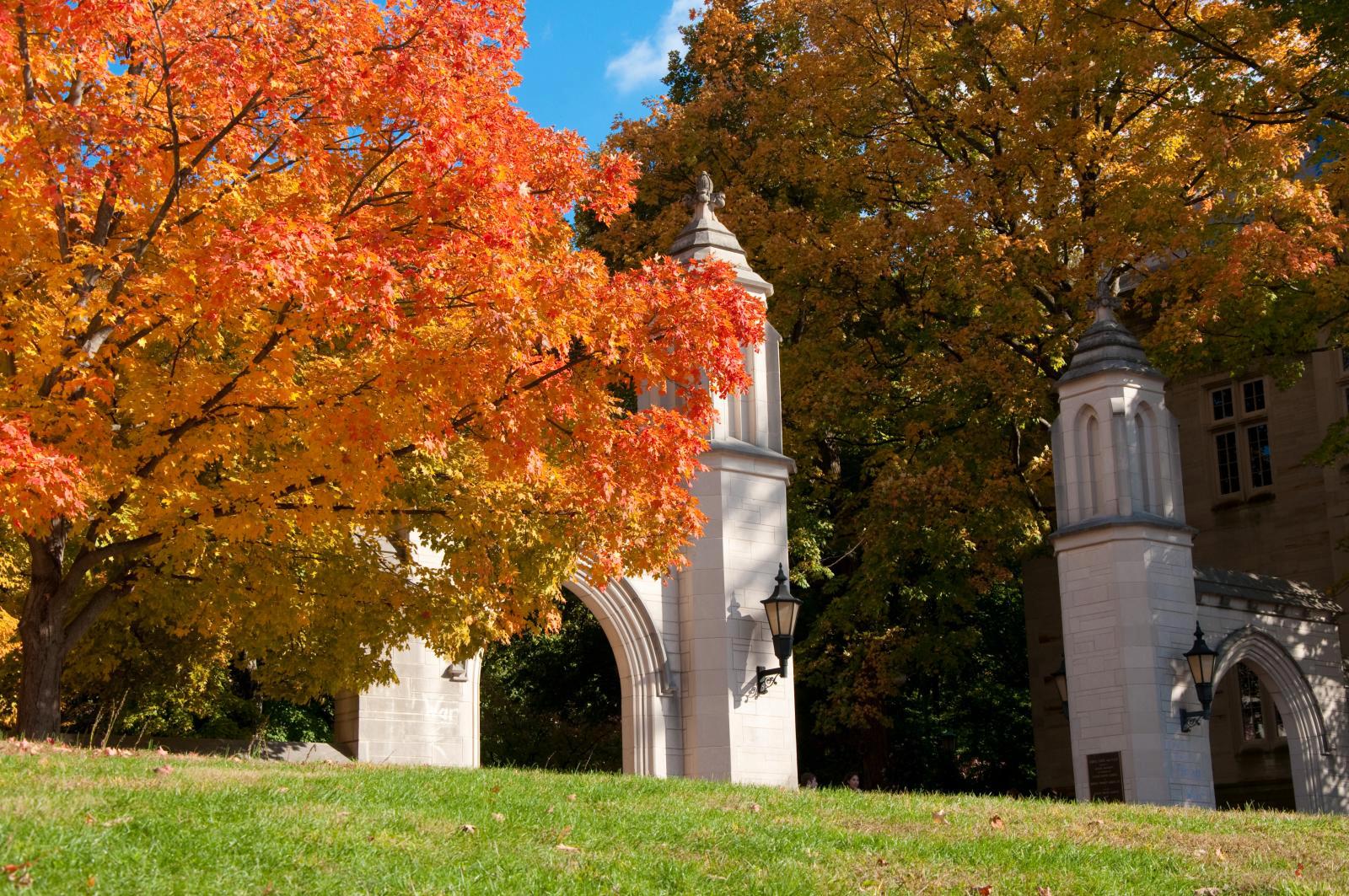
From its founding 200 years ago, this university has advocated the education rights of African-Americans and Newsweek ranks it No. 9 among the Best Gay-Friendly Schools.
IU is the ranked No. 89 in the country's Best Institution of Higher Education, according to U.S. News & World Report. The university is known as a "private Ivy," meaning that its academic quality is comparable to that of the private schools in the Ivy League. Many of IU's degree programs place in the top 10 nationally. Alumni, faculty, and researchers have won nine Nobel Prizes and 20 Pulitzers. The campus is consistently rated as one of the most beautiful in the United States. More than 40,000 students are enrolled in 16 colleges and schools, and the university has more than 300 overseas study programs in 50 countries. The Master's in Library Science is a 36 credit hour program that can be completed in one year by students who take 12 graduate-level courses during their senior year at the baccalaureate level. Foundation requirements are classes in User Services and Tools, Representation and Organization, and Perspectives in Librarianship. Students also must choose from a large menu of electives and complete an internship.
Graduate Tuition/Fees: $8,956 / $30,125
#9 – University of Washington-Seattle
Master of Library and Information Science
Seattle, Washington

This public school came in at No. 14 in the 2018 Academic Ranking of World Universities, also known as the Shanghai Ranking.
UW is a mammoth university, with more than 54,000 students in 16 colleges that award 12,000 graduate degrees every year. The institution's history dates to 1861, about 10 years following the founding of Seattle. The vibrant, modern, city is home to Amazon, Boeing, Microsoft, and Nintendo. Twenty people associated with the university have won Nobel Prizes. There are 26 libraries on campus. Washington accepts only about 53 percent of applicants but graduates 84 percent of them. The master's program in Library and Information Science, available on campus or online, touts its small class sizes and high job-placement rate. It typically takes students two years to complete 63 quarter credits. Core courses are The Question of Information; Information Behavior; Information Resources, Services, and Collections; Organization of Information and Resources; Information and Society; Instructional and Training Strategies; Research Assessment and Design; Management of Information Organizations; and Information Technology. Students also must take elective classes and perform a capstone project.
Graduate Tuition/Fees: $15,207 / $27,255
#8 – Florida State University
Master of Science in Information
Tallahassee, Florida
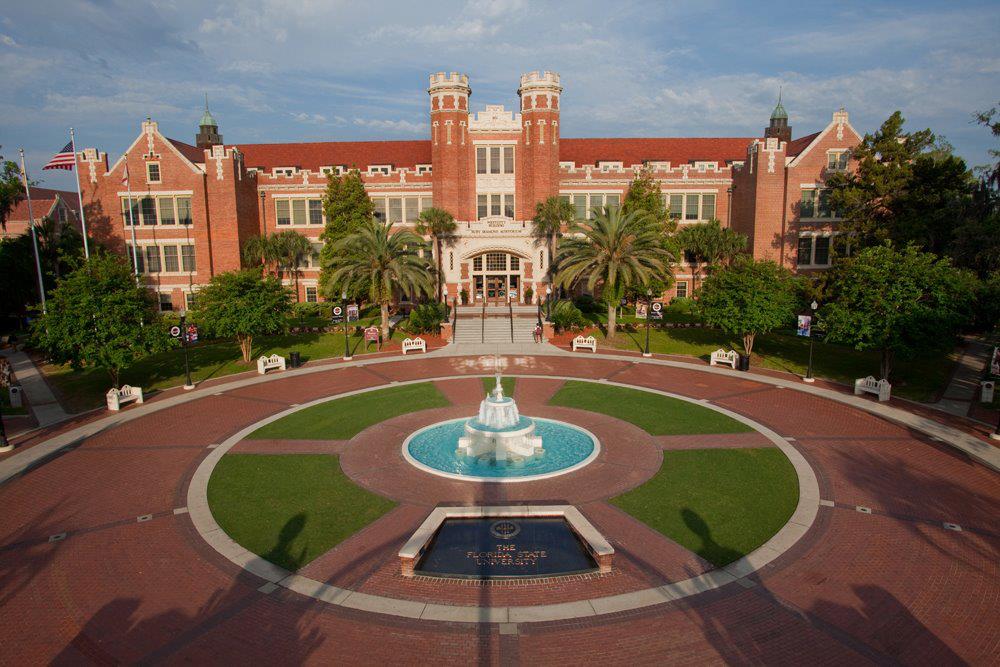
FSU has climbed 17 spots to No. 26 in the past three years in the U.S. News & World Report rankings of the nation's Best Public Universities due to an improved graduation rate, lower student-to-faculty ratio, and more small classes.
Founded in 1851 in the northern Florida Panhandle, this institution has expanded to 16 colleges that offer more than 300 academic programs including 112 master's degrees. The enrollment of 41,900 students represents 132 countries, and nearly half of the students are minorities. FSU officials note that admission to the online Master's in Information is highly competitive with an acceptance rate of just 38 percent in the fall of 2018. Work experience and baccalaureate grades are major factors in the selection process. The 37 semester hour program's core courses are Research Methods in Information Studies, Assessing Information Needs, Introduction to Information Policy, Foundations of the Information Professions, and Management of Information Organizations. A student may specialize in general librarianship; public, academic, and special libraries; health informatics; information organization; leadership and management; reference services; technology and networking; web design; youth services; or museum theory and practice. There is a six semester hour thesis option.
Graduate Tuition/Fees: $9,684 / $24,116
#7 – Rutgers University-New Brunswick
Master of Information
New Brunswick, New Jersey

Rutgers, initially called Queen's College, came into being in 1766 as one of the first nine colonial colleges before the United States became a country.
This public research university ranks No. 70 on the U.S. News & World Report's list of the nation's Best Postsecondary Institutions. More than 41,300 students are enrolled in 17 colleges that offer 340 different degree programs. The faculty includes six Nobel Prize laureates. The admissions policies are quite selective with only about half of freshmen who apply winning acceptance. The Master's of Information, a 36 credit program, is available on campus or online. Full-time students complete the requirements within 18-24 months. The program is No. 1 in the country for School Library Media, according to U.S. News. Core courses are Human Information Behavior, Organizing Information, Management Principles in Information Organizations, Knowledge and Society, and Introduction to Library and Information Professions. Students also must attend a colloquium in Library and Information Studies, and take part in a capstone project. There are focused concentrations in Data Science; Library and Information Science; School Library Media; Archives and Preservation; Interaction Design and Informatics; and Technology, Information and Management.
Graduate Tuition/Fees: $16,848 / $28,656
#6 – University of Wisconsin-Madison
Master of Arts in Library and Information Studies
Madison, Wisconsin
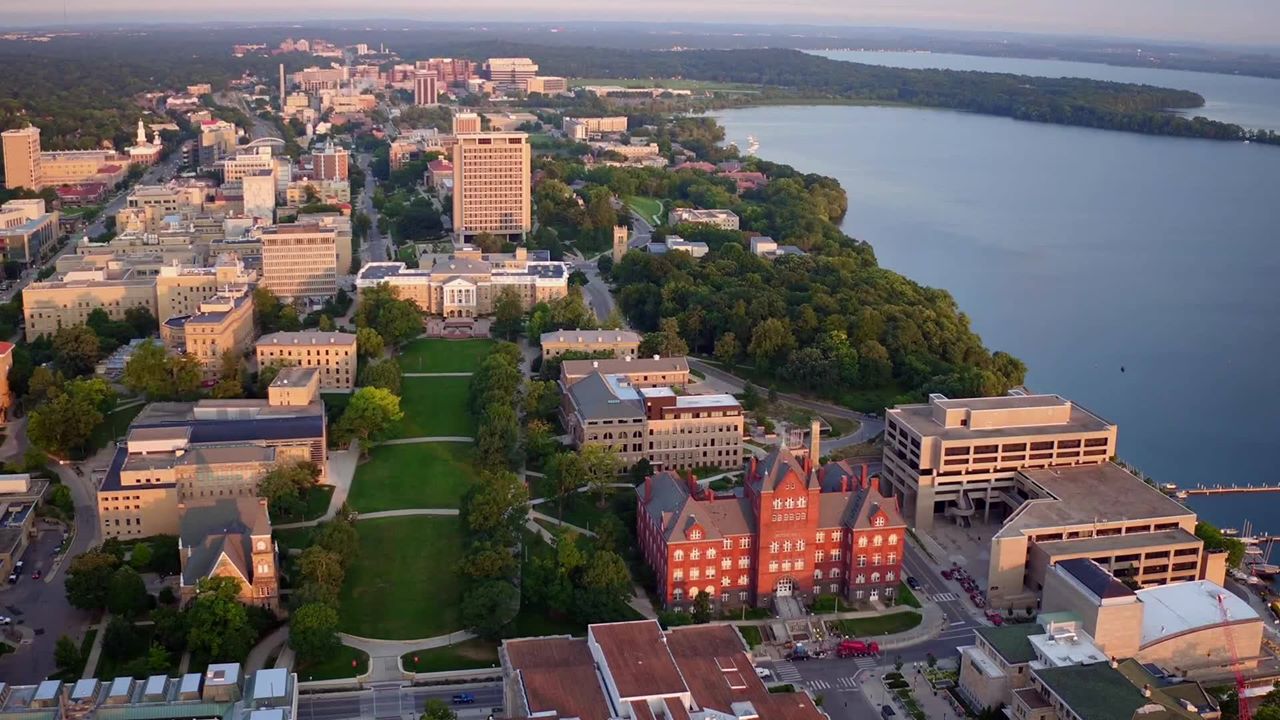
This university features a program called the Wisconsin Idea, in which students serve low-income residents of the community with food distribution, the tutoring of children, and other efforts.
A public institution founded in 1848 UW-Madison has 44,411 students in 13 schools and colleges. It ranks No. 6 nationally in research expenditures, and places in the top 10 for graduating future CEOs of Fortune 500 companies. Alumni and faculty have won 19 Nobel Prizes and 39 Pulitzers. The acceptance rate for freshmen applicants in the fall of 2018 was just over 50 percent. Madison is the "best place to live in America" among cities with populations between 20,000 and 350,000, according to the Liveability company. The Master's in Library and Information Studies is a 39 credit hour program that students may take on campus or online. Students may concentrate in Librarianship, Archives in a Digital Age, Data/Information Management and Analytics, UX and Information Technology, or Information Organization.
Graduate Tuition/Fees: $10,728 / $24,054
#5 – University of Illinois at Urbana-Champaign
Master of Science in Library and Information Science
Urbana-Champaign, Illinois

This institution's campus hosts 37 libraries, with one of the largest collections of any public university; as well as two major museums and the renowned Krannert Center for the Performing Arts.
U.S. News & World Report ranks the University of Illinois at Urbana-Champaign No. 13 among the nation's public universities. The enrollment totals more than 47,000 students, from all 50 states and over 100 countries. Alumni and faculty have won 11 Nobel Prizes and 28 Pulitzers during the university's 150-plus year history. The Master's in Library and Information Science is the best of its kind in the country, according to U.S. News. There are on-campus and online options. The only mandatory courses are Information Organization and Access as well as Libraries, Information, and Society. Students may fulfill some of the requirements with a practicum providing professional field experience, independent study inside or outside the program, IS practice at an off-campus library or information center, or a thesis.
Graduate Tuition/Fees: $15,186 / $28,773
#4 – University of Michigan-Ann Arbor
Master of Science in Information
Ann Arbor, Michigan

UM is the nation's fourth-best public university, according to U.S. News & World Report and it ranks No. 21 in the world on the Wall Street Journal / Times Higher Education's list of postsecondary institutions.
This university has been awarding degrees since 1817, 20 years before Michigan became a state. Money magazine has ranked UM as the third-best college for your money, and Forbes magazine considers Ann Arbor the best college town in the United States. More than 28,000 students, from all 50 states and 128 countries, take classes in 19 schools with a student-to-faculty ratio of 15:1. People associated with UM have won 25 Nobel Prizes. The master's in information program, where 461 students are enrolled, entails 48 credit hours that require at least two years to complete. Core courses are Programs, Information, and People; Introduction to Information Studies; Data-Oriented Programming; Opportunity in the Age of Intelligent Machines; Models of Social Information Processing; Information Environments and Work; Special Topics in Information; Interpersonal and Psychological Implications of Social Media; Graphic Design; Data Manipulation; Persuasion and Social Influence; Social Media in Organizations; as well as Web Design, Development, and Accessibility.
Graduate Tuition/Fees: $22,368 / $45,156
#3 – University of Maryland-College Park
Master of Library and Information Science
College Park, Maryland
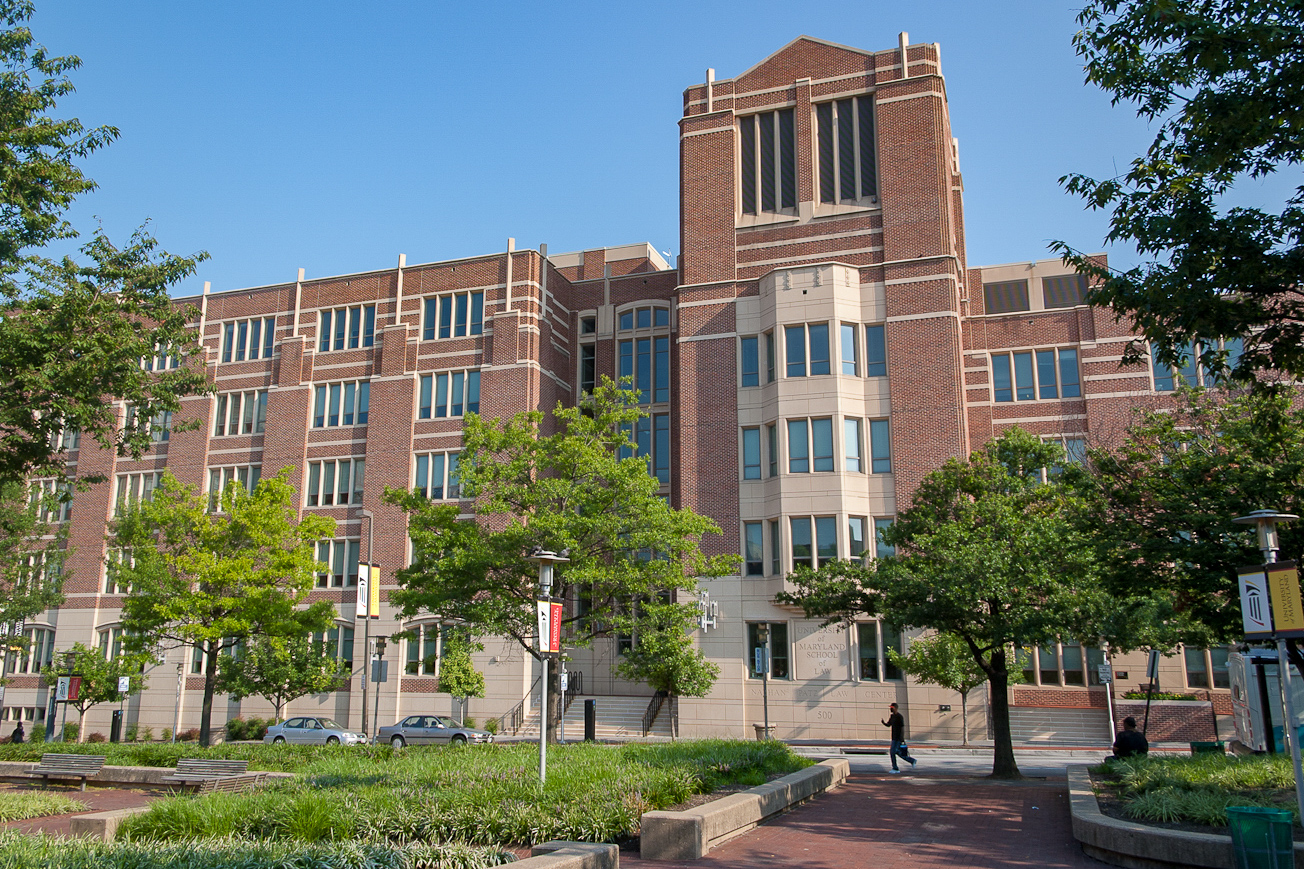
This was the first university to earn the "Do Good Campus" designation for promoting community engagement, philanthropy, and social change.
UMD, a leading public research institution, traces its history to 1856. It is the No. 63 postsecondary school in the country, according to U.S. News & World Report; and ranks eighth on the Kiplinger's Personal Finance list of Best Value Colleges. There are more than 41,000 students and 14,000 faculty. The university accepts less than half of freshman applications. The campus is between Washington, D.C., and Baltimore, where major corporations and government agencies provide many internship opportunities. U.S. News places the university's College of Information Studies eighth in the country. The Master's in Library and Information Science entails 36 credit hours of coursework, plus either field work or a thesis, with online and on-campus options. The core classes are Serving Information Needs, Achieving Organizational Excellence, Creating Information Infrastructures, and Designing Principled Inquiry. Students may specialize in Diversity and Inclusion, Individualized Program Planning, School Libraries, Youth Experiences, Archives and Digital Curation, Intelligence and Analytics, or Legal Informatics.
Graduate Tuition/Fees: $12,294 / $26,532
#2 – University of California-Los Angeles
Master of Library & Information Science
Los Angeles, California
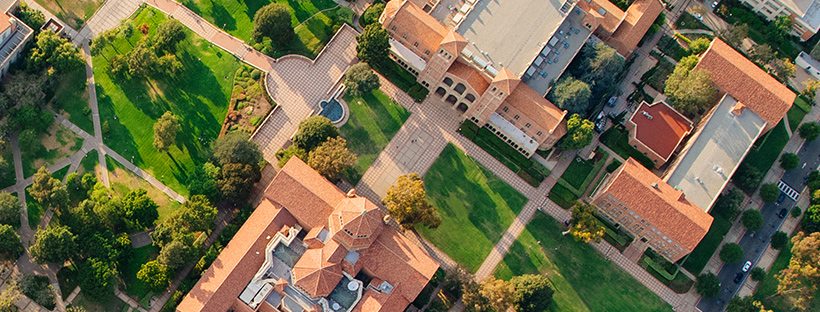
UCLA students and faculty have won 14 Nobel Prizes, 13 MacArthur fellowships, 38 Academy Awards, and more Olympic medals than most countries.
This public school is the world's 17th-best university in the Wall Street Journal / Times Higher Education rankings. The enrollment totals 45,428 students in 109 academic departments. The sprawling 400-acre campus, in the country's second-largest city, is just a few blocks from the Pacific Ocean. UCLA receives about 100,000 freshman applications every year, the most of any university, and accepts only 18 percent of them. There are 150 graduate degrees, including the Master of Library and Information Science. The two-year program typically involves about 90 students, 76 percent of whom are women. The core courses are Artifacts and Culture, Values and Communities, Description and Access, as well as Systems and Infrastructures. Students can specialize in Archival Studies; Informatics; Library Studies; Media Archival Studies; or Rare Books, Print, and Visual Culture. Additional requirements are a 120-hour internship, with more than 300 choices on campus and in the community; and either a portfolio or a thesis.
Graduate Tuition/Fees: $11,502 / $26,604
#1 – University of North Carolina at Chapel Hill
Master of Science in Library Science
Chapel Hill, North Carolina
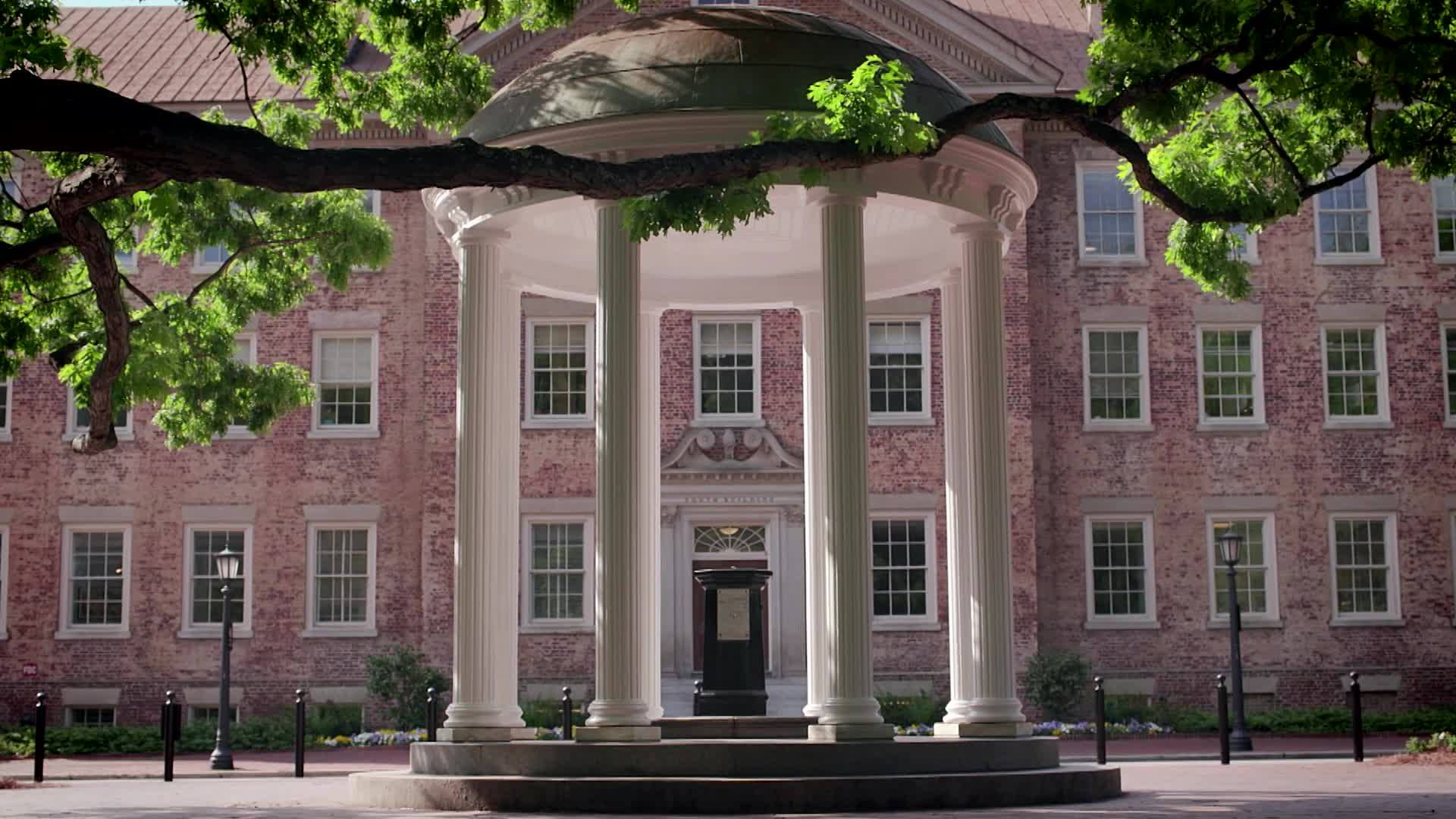
UNC, which has placed first on the Kiplinger's Personal Finance list of Best Value Colleges for 17 straight years, guarantees a debt-free education for low-income students.
The first public institution of higher learning in the United States, this university traces its history to 1795. Nearly 30,000 students, more than 11,000 of them in graduate and professional schools, are enrolled. The student-to-faculty ratio is an impressive 13:1. The Master's in Library Science Program is the best of its kind on the planet, according to the QS World University ranking. A prerequisite is either passing an Information Technology competency test or taking a tech class. Core courses are Human Information Interactions, Information Resources and Services, Resource Selection and Evaluation, Organization of Information, Overview of Research Methods, Management for Information Professionals, as well as Proposal Preparation and Presentation. Students also must write a master's paper, pass a comprehensive exam, and obtain 135 hours of field experience. Specializations are available in Academic Libraries, Adult Services in Public Libraries, Archives and Records Management, Children and Youth Services, Digital Libraries, Organization of Information and Materials, Reference, School Library Media Coordinator, and Special Libraries and Knowledge Management.
Graduate Tuition/Fees: $9,943 / $27,154